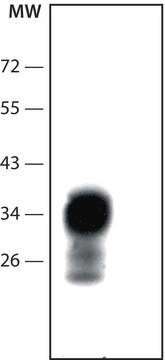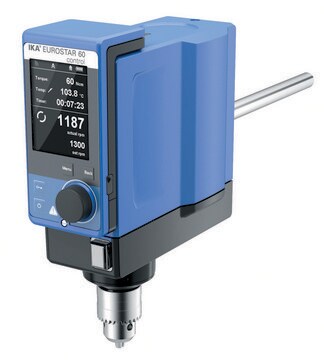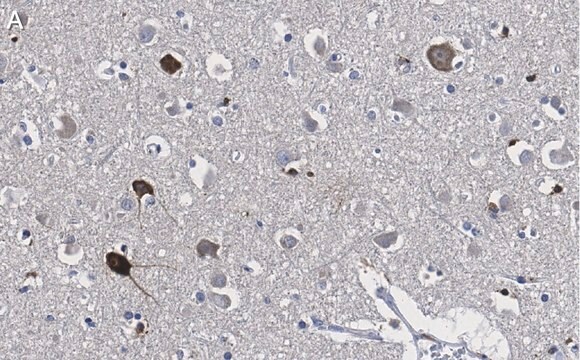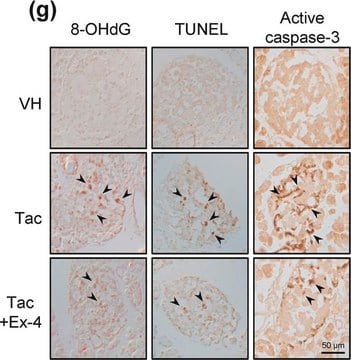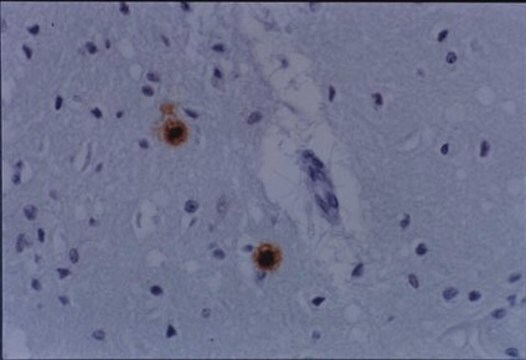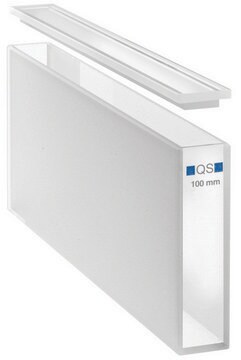ZRB1924
Anti-Prion Protein Antibody, clone 3F17 ZooMAb® Rabbit Monoclonal

recombinant, expressed in HEK 293 cells
About This Item
Produtos recomendados
fonte biológica
rabbit
Nível de qualidade
recombinante
expressed in HEK 293 cells
conjugado
unconjugated
forma do anticorpo
purified antibody
tipo de produto de anticorpo
primary antibodies
clone
3F17, recombinant monoclonal
descrição
3F17 Clone
linha de produto
ZooMAb® learn more
Formulário
lyophilized
peso molecular
calculated mol wt 27.66 kDa
observed mol wt ~37 kDa
reatividade de espécies
mouse, human
embalagem
antibody small pack of 25 μL
características do produto alternativo mais ecológico
Waste Prevention
Designing Safer Chemicals
Design for Energy Efficiency
Learn more about the Principles of Green Chemistry.
validação aprimorada
recombinant expression
Learn more about Antibody Enhanced Validation
sustainability
Greener Alternative Product
técnica(s)
affinity binding assay: suitable
flow cytometry: suitable
immunocytochemistry: suitable
immunohistochemistry (formalin-fixed, paraffin-embedded sections): suitable
western blot: suitable
Isotipo
IgG
sequência de epítopo
N-terminal half
nº de adesão de ID de proteína
nº de adesão UniProt
categoria alternativa mais ecológica
Condições de expedição
ambient
temperatura de armazenamento
2-8°C
modificação pós-traducional do alvo
unmodified
Descrição geral
Each ZooMAb® antibody is manufactured using our proprietary recombinant expression system, purified to homogeneity, and precisely dispensed to produce robust and highly reproducible lot-to-lot consistency. Only top-performing clones are released for use by researchers. Each antibody is validated for high specificity and affinity across multiple applications, including its most commonly used application. ZooMAb® antibodies are reliably available and ready to ship when you need them.
Learn more about ZooMAb here.
Especificidade
Imunogênio
Aplicação
Evaluated by Western Blotting in Mouse brain tissue lysate.
Western Blotting Analysis: A 1:1,000 dilution of this antibody detected Prion Protein in Mouse brain tissue lysate.
Tested applications
Immunohistochemistry (Paraffin) Analysis: A 1:1,000 dilution from a representative lot detected Prion Protein in human cerebral cortex and human Alzheimer′s diseased brain tissue sections.
Immunocytochemistry Analysis: A 1:1000 dilution from a representative lot detected Prion Protein in SH-SY5Y cells.
Affinity Binding Assay: A representative lot of this antibody bound Prion Protein peptide with a KD of 1.0 x 10-12 in an affinity binding assay.
Flow Cytometry Analysis: 1 μg from a representative lot detected Prion Protein in one million SH-SY5Y cells.
Note: Actual optimal working dilutions must be determined by end user as specimens, and experimental conditions may vary with the end user
Descrição-alvo
forma física
Armazenamento e estabilidade
Informações legais
Exoneração de responsabilidade
Não está encontrando o produto certo?
Experimente o nosso Ferramenta de seleção de produtos.
Código de classe de armazenamento
11 - Combustible Solids
Classe de risco de água (WGK)
WGK 1
Escolha uma das versões mais recentes:
Certificados de análise (COA)
Não está vendo a versão correta?
Se precisar de uma versão específica, você pode procurar um certificado específico pelo número do lote ou da remessa.
Já possui este produto?
Encontre a documentação dos produtos que você adquiriu recentemente na biblioteca de documentos.
Nossa equipe de cientistas tem experiência em todas as áreas de pesquisa, incluindo Life Sciences, ciência de materiais, síntese química, cromatografia, química analítica e muitas outras.
Entre em contato com a assistência técnica